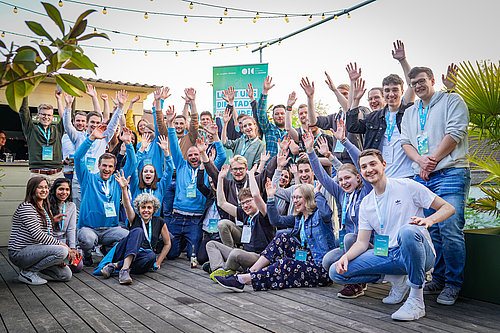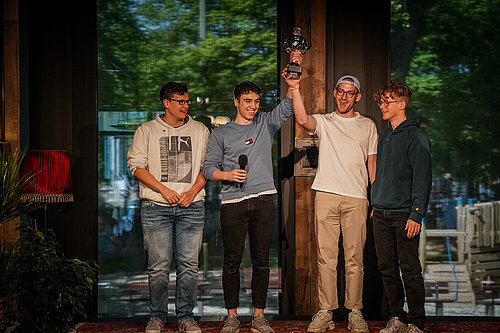BIE green! - City Hack: Bielefeld becomes a green city
To avoid ecological collapse, cities and communities are looking for different ways to act more sustainably and think greener. With the pilot test of a city-wide green hackathon - a modern idea competition - the research project Open Innovation City (OIC) has brought together the swarm intelligence of urban society in one place to solve the sustainability challenges of the city together - with success! Because at the BIE green! - City Hack, 42 participants came together, divided into eight teams, and worked on four central topics over three days. The result was many good prototypes that convinced the responsible parties and will also be implemented in the near future.
The challenges to be solved came from the digitalization office of the city of Bielefeld, Phoenix Contact, Brownfield24 and Cirquality OWL, all of which see different approaches for a green city of tomorrow. In the premises of the Founders Foundation, the participants received workshops and team-building measures as well as many tips from many Bielefeld thought leaders, who helped with their wealth of experience. From Friday to Sunday, the teams had time to turn their ideas into real solutions to present to the challengers. In the end, four teams prevailed and were rewarded with a winning prize of 1,000 euros.
Teams convince with their ideas
With an early warning system for beekeepers, the "BIE Hive" team came out on top in the digitalization office's bee challenge. With the collection of sensory data, it is possible to track whether a bee colony wants to swarm or whether the colony is doing well by measuring temperature, vibration or frequency. In addition, the locations and all other data of the bee colonies are publicly available to interested parties. It was above all the idea of open data that convinced those responsible at the city of Bielefeld.
"greenEye" measures, visualizes and simulates the environment via a specially programmed tool and recognizes through LoRaWAN sensors, the conditions on site (soil moisture, CO2, fine dust, etc.). Through a live demonstration, the team was able to show how the environment changes when parameters are changed on site. The prototype is based on open source code that can be further developed at any time. It was a solution that convinced Phoenix Contact, earning the team an invitation to its headquarters to follow up on the idea on site.
To reduce littering in public spaces, "Circle City" has launched a new approach. By renting out reusable trash machines, cities, restaurants and citizens can reduce the burden. By taking back reusable bowls and cups, they remain in a continuous cycle and do not have to be disposed of at great expense, but can be returned to the restaurateur. A laser detects which type of item goes into the "garbage can". A conclusive idea for waste avoidance in the city center.
Land and soil are important resources for healthy habitats, but often a scarce commodity in cities and municipalities. However, there is no standardized overview of free, sealed or fallow land. Geondis" has found a suitable solution. The solution is based on the consolidation of existing data (e.g. aerial photographs) and the commitment of citizens, who are motivated by an additional reward system. The results are made visible via a map overview. The idea convinced not only the challenge giver brownfield24, but also the audience. Via voting, the team was rewarded with the prize for the best idea and will now fly to Tampere (Finland) for the Smart City Week in the second week of June together with the team of the OIC.
Dr. Henning Duderstadt, Head of Innovation Office
"Environment concerns us all. Open Innovation gives us the opportunity to find fellow campaigners, supporters and like-minded people to work together on an idea and share the results with the city's citizens. At the BIE green! - City Hack, we saw that we can achieve this goal in very few days, because the solutions that emerged have an outstanding quality and a high relevance for the city."
Wiebke Kersten, Project Manager Open Innovation City
"With the pilot test of a green hackathon, we wanted to tackle the green issues of the future with the swarm intelligence of the urban society. This was fully successful, as the teams approached solving the problems with enormous creativity, motivation and inventiveness. We are convinced that this way of finding solutions will continue to be a very suitable way to solve tomorrow's challenges."
Philip Prestele, moderator BIE green! - City Hack
"If we want to achieve the climate goals, we need fast and unbureaucratic solutions. The idea of a hackathon lends itself formally to this. Creative people getting together over a weekend and working on forward-looking solutions within a very short time - that's insane, fun and shows how much potential there is in people."
















